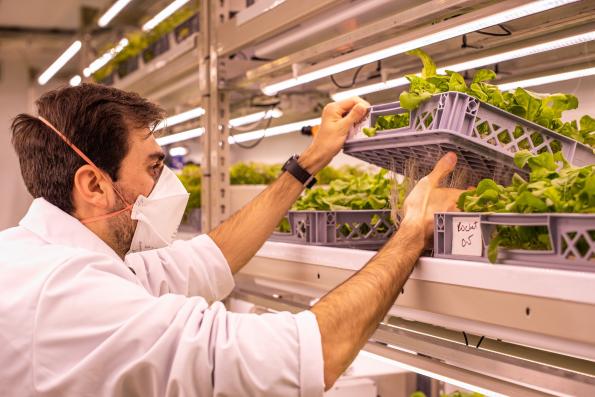
Indoor farming technology provider LettUs Grow has teamed up with Harper Adams University to trial different technologies and irrigation systems within greenhouse and vertical farms
Both greenhouses and vertical farms are types of controlled environment agriculture (CEA) using
LED lighting and hydroponics. All forms of CEA offer the opportunity to grow all year round, through adverse weather conditions or in extreme climates, and reduce the need for pesticides and herbicides.
UK-based technology developer LettUs Grow will work with Harper Adams University in Shropshire over the next year to look at crop yields, energy consumption and explore how productivity is affected across seasons in order to determine the best combination of technologies for food systems that can be both productive and sustainable.
LettUs Grow developed smart control and farm management software that will be used within the greenhouse and vertical farm trials. The Ostara software can be used to tailor lighting, irrigation, nutrient delivery and environment to specific crops within the same farm, as well as being used to collect a wide range of farm data to help improve productivity and efficiency.
The trial, which will span across most of 2021, will explore the environmental impact and compare growth data from two irrigation systems, aeroponics and hydroponics, in different settings: an aeroponic vertical farm and greenhouse, and a hydroponic greenhouse.
Hydroponics is a method of soil-less growing, where plant roots are submerged in a body of water, whereas in aeroponics plant roots are irrigated with a fine mist of water and nutrients. Aeroponics systems developed by LetUs Grow can provide greater precision, use less water and deliver faster growth rates. Energy consumption can be one of the largest overheads for a vertical farm for the LED lighting and temperature and humidity control, so one key element of the trials will be to identify whether an increase in energy use is balanced by an increase in farm productivity. While the technologies can grow a wide range of crops, the trial will focus on growing kale and pea shoots, allowing for two repetitions per crop, per season.
“Our food supply chain needs to be diversified to achieve productivity and stability, which means maximising the benefits of new technologies in different horticultural environments. The advanced greenhouse industry is a huge part of modern food production and is entering an exciting new phase of growth to help meet global production and sustainability targets. We want to help this industry to grow more, sustainably,” said Charlie Guy, co-founder and CEO of LettUs Grow.
“There is great potential for vertical farming technologies to be incorporated into greenhouses, where they provide greater control and enhance growth rates, whilst taking advantage of natural sunlight to cut energy demands.”
Harper Adams University is the UK's leading specialist university for the agri-food and rural business sectors. The Urban Farming Group is a cross-disciplinary collaboration of academics that are interested in how growing systems such as controlled environment, vertical farming and aeroponics can rejuvenate urban areas, revolutionise food systems, provide activities to encourage social innovation and develop novel and successful business models across all landscapes.
“This is a particularly exciting project, greenhouses provide the half -way house between field based production and total controlled environment agriculture. They are excellent systems to apply to urban spaces, such as building rooftops,” said Dr Laura Vickers, Senior Lecturer in Plant Biology and coordinator of the Urban Farming Group.
“Quantifying the performance of technologies developed by LettUs Grow in our campus greenhouses, opens up the ability to assess resource efficiency, and evaluate how crop production could work in a variety of landscapes that could bring an array of stakeholders that we just don’t see at the moment”.
Ricardo Lopes, Research Scientist at LettUs Grow and research lead on the project, said: “Bringing aeroponics into a greenhouse setting is really exciting, as traditionally they run on hydroponics. There has been little research into this before so we’re starting from scratch.
“There is huge potential in the opportunity to combine the precision of high-tech greenhouses with optimised aeroponic irrigation - meaning we could offer the plant the exact amount of water it needs, when it needs it, alongside the unique environmental control of greenhouse technology. The prospect of using aeroponics to decrease water usage within greenhouses could be a very important step in making greenhouse production even more sustainable and less energy demanding.”












